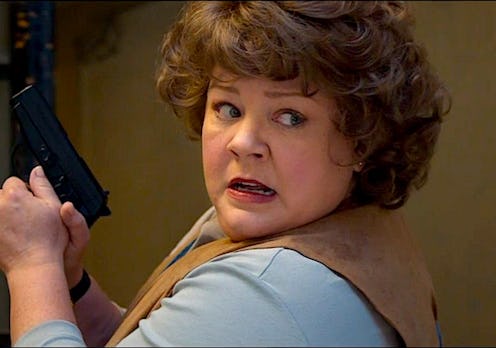Entertainment
'Spy' Is The Perfect Post-Sexism Movie

There is a significant distinction to be made between Paul Feig's Spy, the latest movie from the filmmaker, and something like Hot Pursuit. Ever present at the forefront of the latter film, which stars Reese Witherspoon as a policewoman swept up in an increasingly complicated rescue mission, is the discussion of gender. Just about every laugh or set piece that befalls Witherspoon’s character is contingent on the idea that she is a woman in a line of work that seems relentlessly adhered to the mutual exclusivity of femininity and competence (at least in the movies). Witherspoon’s recent cop flick is hardly the only film to rely on gender contrast for both humor and conflict: Miss Congeniality does it. Even Feig’s own The Heat plays into the sexism innate to heroes Sandra Bullock and Melissa McCarthy’s typical workday. But Spy seems like it's already past this gambit; it's almost "post-sexist."
It’s important to look at Feig’s past works in order to recognize exactly what Spy has on its mind. The filmmaker’s cultural and industrial motives are hardly a secret: Feig has virtually made it his life’s work to show audiences and studios alike that women are indeed funny (funny enough, in fact, to sell blockbusters). He kicked off this rally with Bridesmaids, a film about women operating with comic vivacity within a realm that even the staunchest of chauvinists wouldn’t have trouble accepting as natural space for female occupancy.
With The Heat, he burst into a genre dominated principally by men. For every Miss Congeniality and Hot Pursuit, there are dozens of male-led cop comedies. The movie played gently into the notion of adversity, facing Bullock and McCarthy against a sexist rival officer and addressing Bullock’s character’s own resistance to traditional femininity.
Spy feels like yet another graduation for Feig, using the groundwork of Bridesmaids and The Heat to engage with a female-led secret agent comedy free from the shackles of the themes of gender. McCarthy returns to Feig’s lens to headline Spy as a desk jockey who advances to field work after the CIA’s top operatives are all compromised by a villainous organization. Yes, the decision to send McCarthy off with her own mission encourages backlash among colleagues. Yes, she finds it particularly difficult to get the hang of the new position. And yes, this “fish out of water” motif is a major source of comedy in the film. But none of this ever has anything to do with the fact that she’s a woman.
In fact, women surround McCarthy in the CIA. Her friend and fellow office drone is played by Miranda Hart; her boss is played by Allison Janney; a respected field agent is played by Morena Baccarin. The question of whether a woman can handle dangerous spy work is never asked throughout the film’s runtime. The questions of competence surrounding McCarthy’s character all root in her personality. She’s a dork. A schlub. A schlemiel and a schlimazel. And also kind of a wily nut.
These characteristics alone are what enliven even McCarthy’s chief detractor, played by Jason Statham, in his tendency to mock her promotion to bona fide secret agent. Her inability to mesh seamlessly with the upper echelon of Europe’s elite crime ring is what conjures the wealth of vitriol and mockery from criminal kingpin Rose Byrne. No one, from deluded “perfect male specimen” secret agent Jude Law to deep-voiced big bad Bobby Cannavale ever for a moment lays even a suggestion of misogyny. It’s not simply that Feig has worn tired of addressing the palpably real issue of sexism in male-dominated industries (or on the big screen), but that he has consciously worked his way up to a place where it should no longer be a required component of his oeuvre.
The idea of “womanhood” was necessary to address outright in Bridesmaids, a proud glorification of female comedy, and somewhat so in The Heat, a determined insistence that women can do wonders with male-led genres. But it would seem almost archaic if brought up in Spy. It’s a film that’s effectively post-gender: One that proves that not all female-led comedies have to be about the fact that they’re female-led comedies.
Images: 20th Century Fox